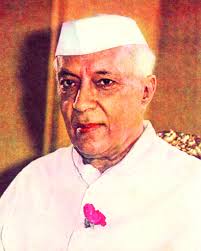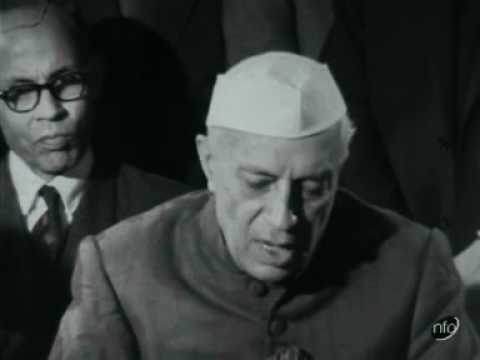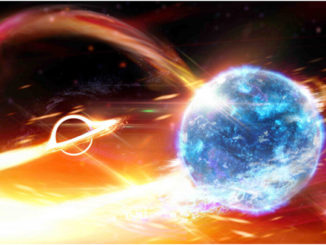
14th November is the birthday of India’s First Prime Minister Jawaharlal Nehru, celebrated as Children’s Day in India.
Nehru’s contribution to making of a modern India cannot be ignored despite the uncouth attempts of the present government to trash one of the greatest men of India and the world.
History has a weird way of remaining alive, sphinx style.
-EDITOR




November 14 has been a ‘Chacha Nehru’s Day’ for so long I can remember, signifying the fondness the first prime minister of India had for the children of India. Growing up in Kerala and being active in the ‘All Kerala Balajana Sakhyam’ (largest Children’s organization in the world after the 4H club at the time), Nehru’s legacy loomed large on many of those organized events where his deep sense of commitment for the future of the young generation was widely acknowledged and admired. In those days, the very question of ‘who is after Nehru’ evoked a sense of anxiety and apprehension in the people’s minds across India. However, 57 years after his death, the question is no longer about celebrating his legacy as the ‘architect of modern India’ but more about how we could defend his life’s work from being tarnished by vested interests and prevent its erasure from history. Ever since Bhartiya Janata Party came to power at the Centre, we are not only witnessing a torrent of criticism by Prime Minister Modi and other officials of the past leaders in the Congress party but a targeted one vilifying and demonizing Jawaharlal Nehru in particular. We are at a point where Nehru’s name does not even find mention in the National Archive’s exhibition on the ‘Quit India’ movement.
It has almost become an obsession for the BJP government to diminish Nehru’s contribution to the development of India using various means that include scrubbing Nehru’s name from state-sponsored history textbooks in schools and outright tales from Prime Minister’s speech in Parliament blaming Nehru for partition. The right-wing influencers and the trolls have joined the chorus inculcating a negative image of Nehru with his lineage, character, and culture within the mindset of the young ones who tend to rely on social media for their information and learning. The Diaspora, the biggest beneficiary of Nehru’s visionary policies regarding Education and other social development, has turned a blind eye towards this incessant attack by RSS and its affiliates and done very little to offset the spread of misinformation. Although Nehru’s accomplishments on the world stage are so phenomenal compared to the office’s current occupant, the PIO/NRI community prefers to be silent as if in obedience to the wishes of the power elites in Delhi.
Nevertheless, the Diaspora is busy celebrating various Indian festivals and keen to remember Mahatma Gandhi, who patronized and pampered Nehru and finally propped him to the helm of Indian politics. However, one wonders whether it is due to sincere reverence to Gandhian principles or to display our outward allegiance to peace and harmony to an unsuspecting American audience. When Gandhian principles are being trampled in India, many of these same folks tend to look the other way.
One of the favorite topics of attacks directed against Nehru is that he has engineered the partition of India for selfish ends. For any history student, it becomes clear that it is not only Congress but British, Muslim League, and Hindu Mahasabha were all part of a larger dynamics at work under the terror of ongoing massacres at the time of independence. V.D. Savarkar’s two-nation theory and Mohammad Ali Jinnah’s adamant demand for Pakistan might have an even more prominent role in creating that undesirable outcome. However, when such stormy winds buffeted the nation, Pandit Nehru steered a newly emerging nation, bringing peace and stability. Some historians also believe that if Nehru and Patel had not accepted the division, it could well have led to the dismemberment of India as we know it today.
What I admire most about him is his self-effacing service to India. He spent almost ten years of his life in prison, fighting for freedom and justice at a time when there was no assurance that it would happen in his lifetime. Among the founding fathers of modern India, Nehru alone had given serious thought to India’s place in the global community. He was able to educate the Indian populace on external affairs even before independence.
India took giant strides under his leadership in areas of Agriculture, Industry, and Technology. He developed agriculture by boosting irrigation facilities with Bhakra Nangal, Hirakund, and Nagarjuna Sagar Dams. Nehru set up heavy industries in a country that was not even producing a safety pin for its consumers and developed educational and research institutions with a number of universities, such as IITs, IIMs, ISRO, BARC, Council of Scientific Indian research (CSIR), and All India Institute of Medical Sciences (AIIMS). He was determined to carry India forward into the modern age with scientific discovery and technological advancements. If India today is successful in Space or Nuclear programs, the credit is squarely due to the visionary mindset of Nehru. It is worth remembering that when Nehru started on this transformational venture, the literacy rate in India was 14 percent, and the life expectancy at 39. Unlike the current dispensation, Nehru was a quintessential democrat who engaged the members of the Parliament in meaningful discourse and refused to see a critic with vindictive revenge. He recognized that dissent is an integral part of the debate, which is vital in a democracy. He did it with utmost grace and civility. Today, even within the Diaspora, people are running scared of a regime that monitors and punishes people for differing opinions.
The forces at work belittling Nehru’s contributions, demeaning his reputation, and removing many of the institutions he has put in places such as the Planning Commission and National Integration Council, are engaged in a total disservice to the nation. Jawaharlal Nehru will remain a great icon in the hearts and minds of Indians for generations to come, even after many of the detractors and vocal critics have been gone and become nothing more than a distant memory! As an adage goes, a statue has never been set up to honor a critic! Nehru’s legacy is too intertwined with the history of modern India,and it is simply unerasable from the nation’s DNA.
(The author is a former Chief Technology Officer of the United Nations. He is Vice Chairman of the Indian Overseas Congress, USA. He can be reached at gta777@gmail.com)





Be the first to comment